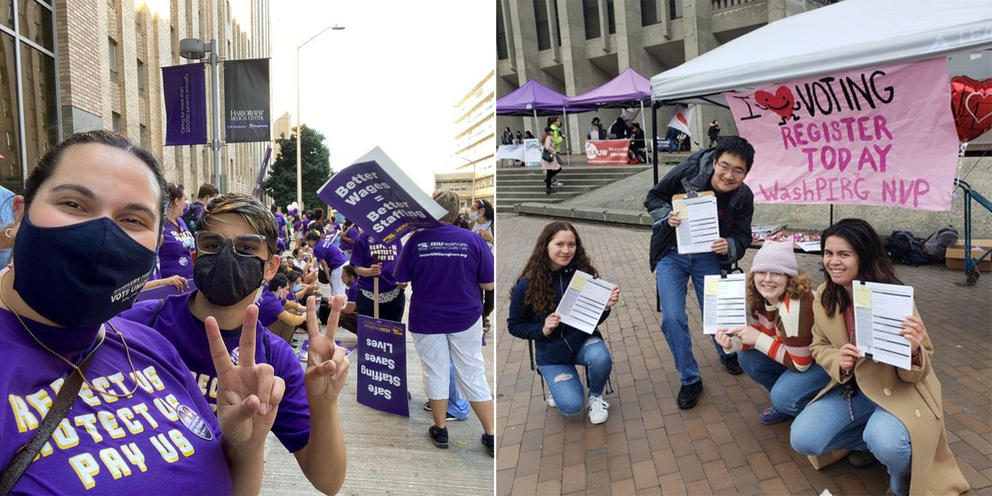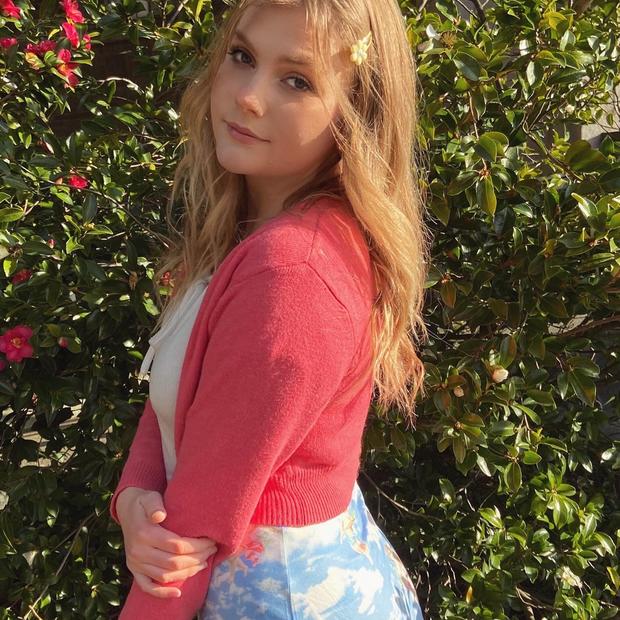“It's hard to say for sure why that is,” Watkins said. “But it definitely seems to be a pattern not just here, but kind of everywhere across the country.”
In the August primary election, only 24% of King County voters in the lowest age bracket, 18 to 24, voted. The same election saw almost 65% turnout among voters 65 and older. While Watkins says recent youth voter turnout in King County does not indicate any major shifts toward higher youth engagement from previous years, a 2020 survey by Center for Information and Research on Civic Learning & Engagement found 27% of 18- to 24-year-olds reported participating in protests that year, an 11-point jump from 2018.
Allison Kirste, a recent University of Washington graduate, was the university chapter chair of WashPIRG, a nonpartisan student group that promotes civic engagement. As campaign coordinator of the organization's New Voters Project, Kirste had a lot of conversations with students whose ballots were waiting unopened on the kitchen counter at their parents’ homes in Tacoma, Shoreline or Yakima.
This is the third story in a three-part series on youth in politics. Part one focuses on young progressive candidates for elected office in Washington. while part two focuses on Seattle activists who've entered politics.
While Kirste says that registration is a barrier for young people who move often — voters have to reregister with every change of address — she sensed in her conversations with young voters an issue beyond logistics. Young people, she said, weren’t convinced voting would change much.
“We’re seeing, especially with young people, a sense of jadedness with electoral politics,” Kirste said.
Kirste herself, who has dedicated 2½ years to “get out the vote” efforts, does not see voting as the only, or even the most effective, means of civic engagement.
Last summer, Seattle protesters paid house visits to city council members, the mayor, even the police chief, demanding a racially just justice system. “Defund the police” was one of many rallying cries of the summer, but now, in the November general election, there are few options to “vote away” the police budget.
“Young people are probably one of the most, if not the most passionate about politics,” Kirste said. “There’s a lot of frustration with how the political system works, and so civic action has to manifest in other ways, like protests. It’s all about finding other ways to be heard.”
In Seattle, advocates of defunding the police have prison abolitionists like Nikkita Oliver and Nicole Thomas-Kennedy on the November ballot running, respectively, for a City Council seat and City Attorney. But neither of the city’s mayoral candidates is promising to eliminate incarceration or radically cut police funding.
Chetan Soni is a high school sophomore and local activist who recently worked on the youth campaign team for progressive mayoral candidate Andrew Grant Houston. Soni was drawn to the campaign because of Houston’s bold plan to defund the police. It didn’t hurt that Houston came from an activist background: Soni had already organized alongside him with the Sunrise Movement, the youth-led climate action push.
“You have to do community outreach on the ground, but then you also have to do electoral politics in order to see the change you want to see,” Soni said. “There's no one or the other. You need both.”
In that spirit, Soni likes to break up his organizing capacity into three parts: 25% within the system, pressuring elected officials; 50% community work, like his involvement with mutual aid networks that distribute food, water and supplies to people who need them; and 25% electoral politics, like his recent work on Houston’s campaign, which garnered less than 3% of the vote, despite drawing $400,000 in contributions.
Soni does not have a strong desire to run for elected office. But, in recent area elections, a few young folks have put their names on the ballot.
Varisha Khan, who was a student activist at the University of Washington, became the first Muslim woman elected to the Redmond City Council in 2019, when she was 24. Mohamed Abdi, a 24-year-old Somali born in a Kenyan refugee camp, is currently running for Tukwila City Council.
Abdi says activism is all he knows. In 2016, when his 16-year-old cousin’s death was initially ruled a suicide, Abdi and his family rallied the community to demand that the Seattle Police Department conduct a more thorough and transparent investigation. Investigators ultimately concluded the teen died in an accidental fall.
“That was a big moment because it just showed the beauty of bringing people together, and how important that is, you know, to be there for one another,” Abdi said. “There's nothing like it.”
Abdi recognizes that current systems are failing people of color, exactly, he suspects, as they were designed to do. But he remains optimistic about electoral politics.
“I come from an activist and organizing background in bringing East Africans together and Black people together and Muslim people together,” Abdi said. “I don’t need a title to validate that. I just want to be in a position where I can make even more of an impact.”
Even if young progressives can mobilize a low-turnout demographic, some cynicism may remain.
“I feel like that it's just a matter of time before community activists-turned-elected officials become career politicians because of that culture inside of government offices,” said Soni, the Seattle teen activist. “It’s a lot of pressure to be against the establishment from inside the establishment.”



